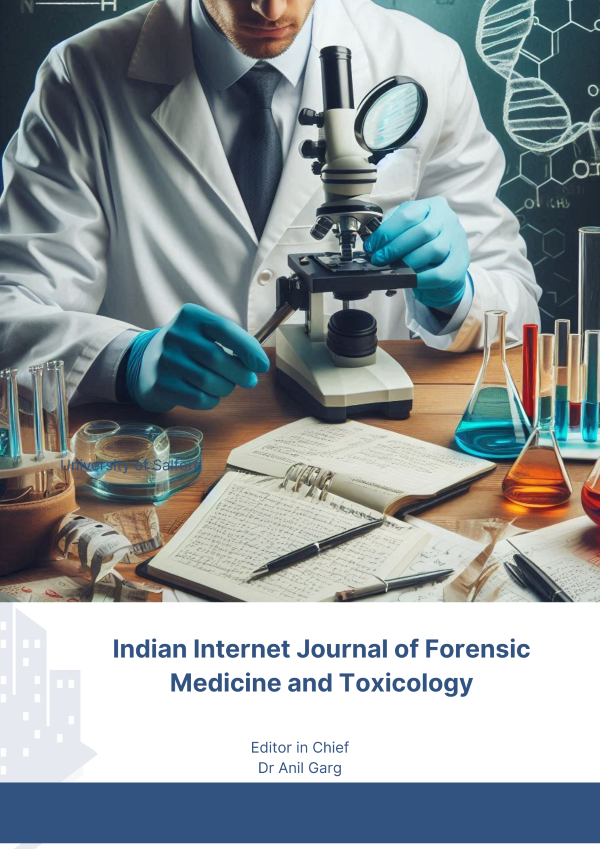Uncovering the Unexpected: Organochlorine Contamination in Viscera in a Fatal Neurocardiogenic Vasovagal Episode
DOI:
https://doi.org/10.48165/iijfmt.2025.23.1.6Keywords:
Inquest, Organochlorine compounds, Autopsy, Neurocardiogenic vasovagal shockAbstract
Inquest is an inquiry or investigation into the cause of death in cases of unnatural deaths, or if there is any suspicion or foul play suspected by the law or investi gation agencies. On request of a Police or Magistrate, the forensic pathologist conducts the medico-legal post-mortem examination. Many a time, it leaves the doctor in a dilemma to determine the exact cause of death especially where the his tory from relatives, police and the facts observed in the autopsy do not match the dots with each other. In these cases, the forensic pathologist sends the viscera for chemical analysis to the FSL (Forensic Science laboratory), which helps the doctor to conclude conclusions. Still, the forensic expert should not stop here giving full recognition to the viscera report only, instead, he should have done the autopsy meticulously and given importance to other factors in the crime scene, keeping all the differentials in his open mind. This case report explores the accidental discov ery of organochlorine compounds in the viscera of a deceased patient who suffered a neurocardiogenic vasovagal shock. The Forensic Science Laboratory (FSL) detected these compounds during routine toxicological analysis. The findings were incongruous with the clinical diagnosis of vasovagal shock and prompted further investigation into the potential sources and health implications of these substances. This report underscores the necessity of comprehensive forensic investigation and the potential for environmental contaminants to complicate death investigations.
Downloads
References
Reddy KSN, Murty OP. The Essentials of Forensic Medicine and Toxicology. 35th ed. New Delhi: Jaypee Brothers Medical Publishers; 2022.
Agrawal A. Forensic Medicine and Toxicology. [Edition, publisher, year needed – please provide for completion.]
The Bharatiya Nagarik Suraksha Sanhita. New Delhi: Gazette of India; 25 December 2023. No. 46 of 2023. Available from: https://www.mha.gov.in/sites/default/files/250884_2_english_01042024.pdf (Accessed September 23, 2024).
Subramanyam BV. Modi’s Medical Jurisprudence and Toxicology. 22nd ed. New Delhi: Butterworth’s India; 1999. p. 1–24.
Journal Articles – Forensic Medicine
Dixit P, Kumari M, Aravindan U, Chawla H. Exploring amended Indian laws in context of forensic medicine: A comprehensive review. IP Int J Forensic Med Toxicol Sci. 2024;9(2):66–72.
Kotabagi RB, Charati SC, Jayachandar D. Clinical autopsy vs medicolegal autopsy. Med J Armed Forces India. 2005 Jul;61(3):258–63.
Kotabagi RB, Pathak PR, Charati SC. Common medico-legal problems faced by medical officers of Armed Forces Medical Services. MJAFI. 2002;58:234–40.
Bhullar DS, Gorea RK, Aggarwal AD. Medico-legal autopsy by panel of doctors: Present scenario. J Indian Acad Forensic Med. 2004;26(3):113–8.
Articles – Organochlorine Pesticides & Toxicology
Kamalesh T, Kumar PS, Rangasamy G. An insight into organochlorine pesticides: Categories, properties, eco-toxicity, and new developments in bioremediation process. Environ Pollut. 2023 Jun 26:122114.
Jayaraj R, Megha P, Sreedev P. Organochlorine pesticides, their toxic effects on living organisms and their fate in the environment. Interdiscip Toxicol. 2016 Dec 1;9(3-4):90–100.
Singh Z, Kaur J, Kaur R, Hundal SS. Toxic effects of organochlorine pesticides: A review. Am J BioSci. 2016 Mar;12(3):11–8.
Sinha R, et al. Uncovering the unexpected: Organochlorine contamination in viscera in a fatal case. [Full journal details needed.]
Articles – Neurocardiogenic (Vasovagal) Syncope
Gracie J, Newton JL, Norton M, Baker C, Freeston M. The role of psychological factors in response to treatment in neurocardiogenic (vasovagal) syncope. Europace. 2006 Aug 1;8(8):636–43.
Fenton AM, Hammill SC, Rea RF, Low PA, Shen WK. Vasovagal syncope. Ann Intern Med. 2000 Nov 7;133(9):714–25.
Sutton R, Petersen ME. The clinical spectrum of neurocardiogenic syncope. J Cardiovasc Electrophysiol. 1995 Jul;6(7):569–76.
Grubb BP. Pathophysiology and differential diagnosis of neurocardiogenic syncope. Am J Cardiol. 1999 Oct 21;84(8):3–9.
Other Toxicological Reports
Boulassel B, Sadeg N, Roussel O, Perrin M, Belhadj-Tahar H. Fatal poisoning by vanadium. Forensic Sci Int. 2011 Mar;204(1-3):e15–7.

